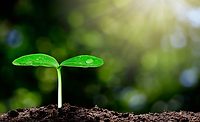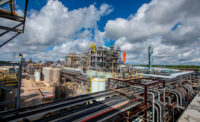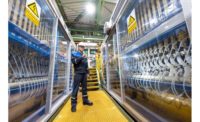Covestro Launches Facility to Produce Plastics Based on Plant Biomass

Worker at Covestro's Pilot Plant for Bio-Based Aniline. Photo courtesy of Covestro.
Covestro is moving forward with the implementation of a unique process for producing the important chemical aniline entirely based on plant biomass instead of petroleum for the first time. The plastics manufacturer has made a seven-digit investment in a special pilot plant at its Leverkusen, Germany, site for this purpose. Initially, large quantities of bio-based aniline will be produced there, so that the new technology can be further developed for production at an industrial scale. In the plastics industry, aniline is used to produce MDI, among other things. This in turn is used for insulating foam, for example, which saves energy in buildings and reduces the CO2 footprint. Covestro believes it will contribute to the promotion of the circular economy, which the company is aiming to become fully aligned with.
“Among other things, aniline is a key raw material for foams used to insulate buildings and refrigerators,” said Dr. Thorsten Dreier, chief technology officer, Covestro. “Until now, aniline has been produced from fossil raw materials such as petroleum, which releases CO2 and fuels climate change. With our new process, we are contributing to building up a circular, bio-based economy, and I am very proud that we have now succeeded in making the jump to the next technological level.”
"Sustainable innovations from North Rhine-Westphalia are making a decisive contribution to the transformation of Germany as a chemical location. The world's first pilot plant for bio-based aniline is an impressive example of this," said Mona Neubaur, North-Rhine Westphalia’s deputy minister president. "In order for the industry to continue on its path towards a circular economy and climate neutrality, it needs planning and investment security above all. As the state government, we are therefore working hard to ensure that North Rhine-Westphalia remains an attractive business location and becomes the first climate-neutral industrial region in Europe."
The research on bio-based aniline will continue to be funded by the German government. The German Ministry for Food and Agriculture is funding a follow-up project (Bio4PURDemo) from Covestro and partners, which started in March 2022 and runs until 2025. The RWTH Aachen with the CAT Catalytic Center and the University of Stuttgart and the technology transfer initiative located there, are also participating in the project.
To learn more, visit www.covestro.com.
Looking for a reprint of this article?
From high-res PDFs to custom plaques, order your copy today!





